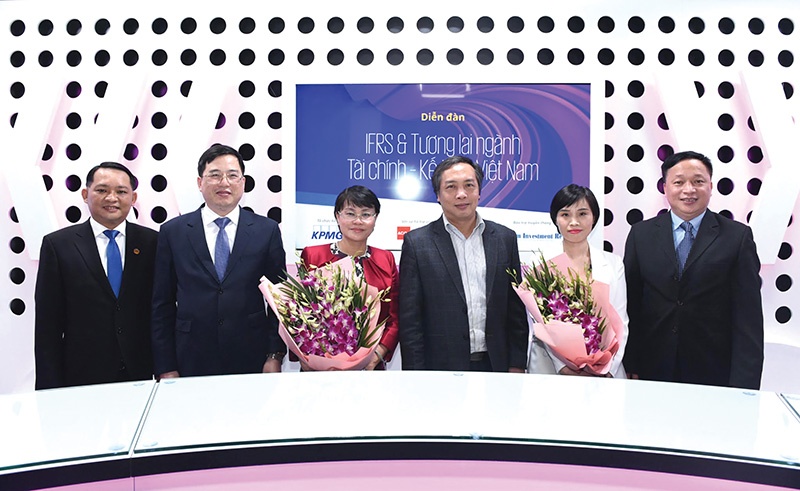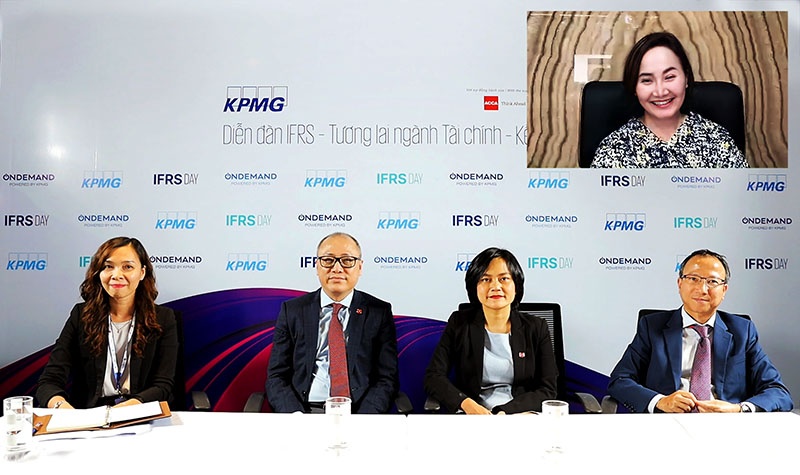Training and cooperation at heart of IFRS compliance
 |
| End-to-end consulting services from the likes of KPMG are assisting companies in figuring out the implementation of IFRS |
By applying new standards in financial reporting, experts believe that Vietnamese entities would enhance their transparency and effectiveness of financial information, as well as harmonise with international frameworks.
Experts at last week’s event “IFRS Day: The Future of Finance in Vietnam”, from KPMG in Vietnam with the support of ACCA Vietnam and VIR, agreed that the worldwide common accounting language will bring about greater transparency of financial information, as well as facilitate access to international markets and boost business competitiveness and attractiveness to foreign investors.
Trinh Duc Vinh, deputy director of the Department of Accounting and Auditing Policy under the Ministry of Finance, revealed that the translation and guidelines of the IFRS Vietnamese version are in the pipeline, and the MoF would publish the final version in the coming time.
“This is one of the essential initiatives that the MoF would speed up to guide state management agencies, corporations, and educational institutions in order to make IFRS more accessible,” Vinh explained.
“The MoF is currently focusing on human resource training to help lecturers in business schools become the “extended arms” of policymakers,” Vinh added. “Educating internationally-qualified human resources is among the most crucial elements towards IFRS compliance, but this is not just a walk in the park or an overnight success.”
In the same vein, Nguyen Thanh Nghi, partner of Audit Services and IFRS Conversion Consulting at KPMG in Vietnam, stated the necessity for professionals would be critical for a nationwide conversion.
“Educating students from an early stage is essential to long-term success,” Nghi suggested.
 |
| Experts at event “IFRS Day: The Future of Finance in Vietnam” in Ho Chi Minh City |
Substantial changes
Nguyen Hong Van, director general of the Agency of Finance and Accounting under the State Bank of Vietnam, highlighted that many banks are currently seeking to adopt various improvements in financial reporting and risk management based on IFRS9 in order to better align with international best practices, thus fostering their competitive advantages and receiving even more attention from world-class investors who may anticipate IFRS-compliant reporting.
“Vietnam’s banks should also comprehend the IFRS-related statements of other corporate customers before executing any decisions, such as approving loan packages,” Van said.
“IFRS9 presents an opportunity for Vietnamese banks to develop a comprehensive risk-finance platform that will help them achieve compliance and boost their credit risk management systems. We believe this would enhance a solid financial sector and prepare Vietnam’s banks for global competition.”
Van also said that the most substantial change for Vietnam’s banks would be the introduction of the expected credit loss (ECL) impairment model in IFRS9 when recognising loss allowances, which aims to promote earlier recognition of credit risk.
KPMG in Vietnam also noted that the technology for IFRS9 has had a variety of key impacts on the way that banks in Vietnam operate in the three main areas of data, computation, and the languages/modelling environment.
“Most banks have had to upgrade their calculation environments. Some may even have had to run different calculation environments in parallel. In addition, banks have had to carry out many stress tests, especially what-if scenarios, to understand their ECL impairment model sensitivities,” KPMG said.
According to a representative from Viet Capital Bank, the bank’s primary constraints are the pressing need for competent human resources who are proficient in IFRS9, as well as the lack of an exhaustive database and top-notch infrastructure. Virtual collaboration in the pandemic-era adoption of the IFRS is also tricky.
On the other hand, Dang Quyet Tien, who is the director general of the Department of Corporate Finance under the MoF, added, “Enterprises’ profitability and business performance may be heavily impacted by the IFRS framework, triggering concerns for investors. But looking on the bright side, pandemic-induced roadblocks have further accelerated digital transformation among IFRS conversion.”
Substantial expenditures on software and associated systems to ensure compliance with new accounting standards would exert pressure on many companies who are eager for IFRS conversion.
“The accountant’s function has evolved from basic debit/credit recording to preparing financial statements based on understanding the nature of transactions. This process could trigger many difficulties for those who are acquainted with VAS,” said Vinh of the MoF. “IFRS financial statements should be reviewed and thoroughly comprehended by managers or owners of the organisations as well.”
Opening access
According to KPMG Vietnam, the road toward IFRS adoption alters not just the company’s accounting practices, but the system as a whole.
Cross-department cooperation is required before the introduction of IFRS in Vietnam in a bid to provide adequate data collection, an enterprise resource planning system, a reporting package, and consolidation.
Furthermore, other success factors involve internal capability building, such as redefining roles and responsibilities, adopting skill training for employees, reshaping the way businesses operate, contracts and agreements, and customer and supplier relationships.
Dang Huynh Uc My, vice chairwoman of the board at sugar group Thanh Cong-Bien Hoa JSC, also shared with VIR the company’s experience in the IFRS conversion journey.
The company is attempting to expand into international markets, with the IFRS statement and English language being given top priority. Its prime objective is to become the market leader in the sugar sector, not only on a nationwide scale but also in a global context.
“KPMG’s comprehensive end-to-end consulting services have also assisted us in navigating the complexity of IFRS, as well as other advanced implementations. The consultancy has advised us to prepare to synchronically integrate our multinational businesses spanning from Laos, Cambodia, Singapore, Australia, and Vietnam, to be in line with international best practices, hence contributing to the upbeat performance of Vietnam’s agriculture sector,” she said.
Tien of the MoF also highlighted that from 2025 onwards, all large-scale companies, especially state-owned economic groups and prominent public firms, that have not yet embraced IFRS in the first place will be required to use it eventually, whether willingly or compulsorily.
“Large-scale organisations should not wait until the last minute. A successful IFRS conversion project requires a number of procedures and factors that may not be perfectly condensed in just a few weeks,” he said.
| Dang Quyet Tien - Director general, Department of Corporate Finance, Ministry of Finance
To implement IFRS, accounting and auditing, corporate finance, and tax units need to work together. Currently, the Ministry of Finance (MoF) is working on modifying some tax and financial laws, such as the Law on State Capital Management at Enterprises, in order to create a favourable environment for enterprises to convert to IFRS in Vietnam. Through coordination with the Department of Accounting and Auditing Regulations, by 2025, we aim to support large corporations and state-owned enterprises while adjusting financial and legal mechanisms accordingly in the process. While the government creates conditions and legal frameworks, auditing and consulting firms directly support businesses. With experience and a critical view of the issue, these agencies need to help us refine our policies and institutions, in accordance with the MoF’s new direction of serving businesses, not managing businesses. Vu Chi Dung - Director general, Department of International Cooperation, State Securities Commission of Vietnam
While working with auditing agencies to provide IFRS training, mostly for listed companies, we found that the first cause for hesitation was the lack of awareness in terms of necessity. The boards of directors and accounting departments need to be made aware of the need for IFRS conversion and be guided to do so in a way that does not affect a company’s daily operations. The second hindrance is human resources and resources. The lack of qualified personnel and refined software poses a challenge to a number of companies, even when they are aware of the benefits. The third is a unified legal framework. The stock market is governed by enterprise and securities law. In this transition, while more enterprises are undertaking IFRS conversion, the laws also need to constantly be adjusted to keep pace, along with training and communication initiatives to prevent misunderstandings. This requires a lot of effort from the government, businesses, and other intermediaries. Nguyen Thuy Minh Chau - Head, ACCA Vietnam
The application of IFRS in Vietnam would bring long-term benefits, not only for businesses but also for the economy. For investors, the transparency that it fosters would enhance trust. For managers and policymakers, it would allow for more focus and efficiency in management, along with more supportive policies for businesses. At a higher level, Vietnam’s capital market would level up in international transparency standards and, as a result, attract capital flow. To support the MoF, ACCA has provided a series of training sessions for the IFRS drafting committee, which includes a number of businesses and university professors, allowing them early access. In addition, realising the need for successor training, our next groups of focus are IFRS-converting businesses and university students. Currently, a large number of businesses in the country have attended training for the IFRS Certificate, introduced by us along with the Vietnam Association of Certified Public Accountants. Overall, we have made a great deal of effort to ensure a smooth transition. Ngo Quang Trung - CEO, Viet Capital Bank
We set up the initial resources to jump-start the IFRS conversation, by establishing a steering committee, implementation boards, and module-based implementation groups. We also specified our criteria for selecting a consulting partner, focusing on experience and resources, both in the international and domestic markets. This is very important, as it directly affects our training activities, data sources, and IT platforms to serve the project. Furthermore, we determined the gap between the current accounting practices based on existing standards. With support from the consulting team, we conducted human resource training while the bank’s management reviewed and made key decisions on projection models. We are currently conducting a test run on 2021 databases and will continue to test on 2022’s data. We will continue to await guidelines and regulations from the state management and plan to fully convert to IFRS by the start of 2023. Nguyen Thanh Nghi - Partner of Audit Services and IFRS Conversion, KPMG Vietnam
Of all the transactions that KPMG consulted in the past year, about 20 per cent of potential buyers required Vietnamese businesses to have financial statements prepared in accordance with IFRS. The recent trend of technology businesses looking to list in the US market has also enhanced the need for conversion. As we are in the preparation process for a full transition, it is helpful to look at the rest of the world for reference. The number of countries with compulsory IFRS applications accounts for 87 per cent, meaning 144 countries. Some countries from the outer section are beginning to transition towards that 87 per cent, including Vietnam and Indonesia. The United States, while maintaining a different accounting system, allows foreign enterprises to prepare financial statements according to IFRS when listed in their market. |
What the stars mean:
★ Poor ★ ★ Promising ★★★ Good ★★★★ Very good ★★★★★ Exceptional
Related Contents
Latest News
More News
- KPMG launches tariff modeller in Vietnam to navigate US tariff risks (July 29, 2025 | 12:11)
- Removing hidden barriers to unlock ASEAN trade (June 29, 2025 | 11:31)
- New report charts path for Vietnam’s clinical trial growth (May 21, 2025 | 08:58)
- TTC Agris strengthens market position with investment in Bien Hoa Consumer JSC (May 19, 2025 | 10:14)
- World Bank to help SBV build shared database for banking industry (April 09, 2025 | 08:55)
- New trade alliances and investment hubs are redefining global power dynamics (April 03, 2025 | 17:00)
- ACCA and KPMG forge path for business leaders to pioneer ESG excellence (March 07, 2025 | 10:09)
- VietBank signs MoU with KPMG (February 26, 2025 | 18:47)
- Warrick Cleine MBE: an honour for services to British trade and investment in Vietnam (December 31, 2024 | 20:16)
- KPMG report offers fresh insight into leveraging AI (December 24, 2024 | 09:23)






 Tag:
Tag:




















 Mobile Version
Mobile Version